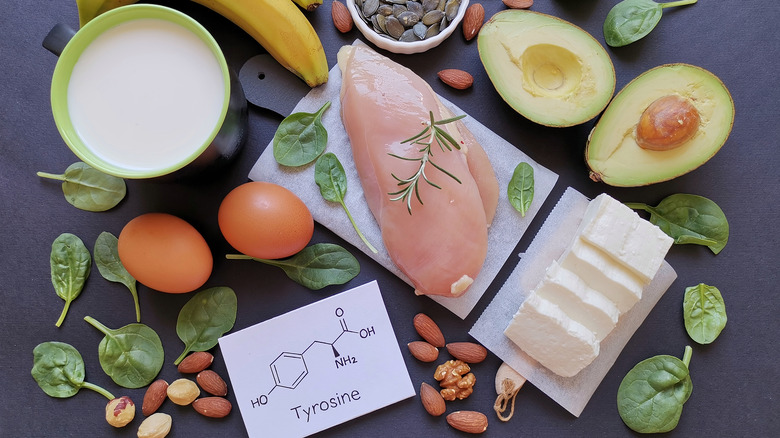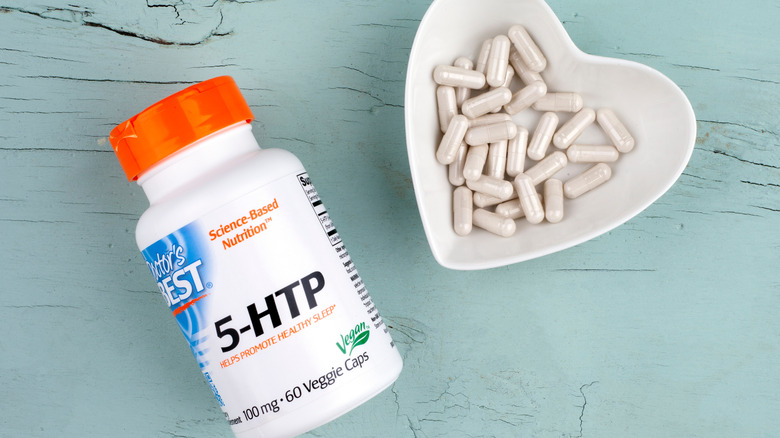The Best Supplements For Seasonal Depression
Are you feeling down for no particular reason? Do your symptoms start in the fall and get worse as the temperature drops? Then you might be dealing with seasonal depression. Also known as seasonal affective disorder (SAD), this condition can affect your mood and suck the joy out of life. It usually occurs at the same time each year, causing anxiety, mood swings, fatigue, low energy, and sadness. Carbohydrate cravings are common, too, notes the Cleveland Clinic.
Researchers say that SAD affects about 5% of Americans. More than two-thirds of those who experience this problem are women. People with anxiety, mood disorders, or eating disorders are more likely to develop SAD, explains the Cleveland Clinic. Scientists can't tell what causes seasonal depression, but they believe it may be due to a chemical imbalance in the brain. Another possible cause is the lack of sunlight, which increases melatonin production and alters your body's internal clock. An excess of melatonin, the sleep hormone, can result in tiredness and diminished mental focus.
On the positive side, there are steps you can take to restore your energy levels and feel like yourself again. Tyrosine, 5-HTP, St. John's wort, and other supplements for seasonal depression can improve your mood and ward off the blues. Your diet matters, too.
Tyrosine can boost your mood and mental focus
Tyrosine, a nonessential amino acid, supports the production of epinephrine, dopamine, and other neurotransmitters. As a result, it can boost your mood and mental focus. Moreover, it may improve your ability to cope with stress and improve cognitive function, according to Medical News Today. This amino acid also helps your brain produce enkephalins, a class of peptides with beneficial effects on mood (via The Recovery Village).
Soy, eggs, beans, fish, meat, and dairy foods are naturally rich in tyrosine, says Medical News Today. However, if you're dealing with seasonal depression, you may need more of this nutrient to function at your peak — and that's where supplements can help. WebMD recommends 150 milligrams of tyrosine per day, split into three doses. Take the supplements before eating in order to maximize their absorption into the bloodstream. For best results, use them along with vitamin B6, vitamin B9, and copper.
5-HTP may ward off depression and anxiety
Drug information pharmacist Jennifer Gershman, PharmD, CPh, says that 5-hydroxytryptophan (5-HTP) could be one of the best supplements for seasonal depression (via Pharmacy Times). After ingestion, this compound is broken down into serotonin, the so-called "happiness hormone." "Increased serotonin equals mood improvement — sometimes within minutes," explains Gershman. 5-HTP appears to work best when used along with methylated B Complex, a high-potency supplement containing B vitamins, notes the American Association of Naturopathic Physicians.
This supplement can be just as effective as some antidepressant drugs, says the U.S. National Library of Medicine. It might also help with anxiety, insomnia, headaches, and health complaints, but more research is needed to confirm these findings, notes Medical News Today. To stay on the safe side, start with a small dose and increase it gradually. Don't use this product if you're taking antidepressants, painkillers, or drugs prescribed for migraines.
Beat seasonal depression naturally
Before you start popping pills, look for natural ways to beat seasonal depression. Jennifer Gershman, PharmD, CPh. recommends tyrosine, melatonin, and St. John's wort — in addition to 5-HTP (via Pharmacy Times). For example, tyrosine boosts the production of dopamine, adrenaline, and norepinephrine in the brain, making it easier to deal with stress. Melatonin, the sleep hormone, regulates your internal clock. St. John's wort supports emotional and mental health, says Gershman. She also suggests taking S-adenosyl-methionine (SAM-e), a dietary supplement that keeps your nervous system functioning properly.
However, none of these products is a miracle cure. They may work for some people, but not for others. You may also need to tweak your lifestyle habits to get into a better mood and beat the blues. "It's better to set yourself up for the winter season by starting in the fall season — doing enjoyable activities, initiating friend group chats and outings, choosing fun hobbies, and engaging in clubs or community service," psychologist Kim Burgess, Ph.D. told Everyday Health. Stay active, fill up on vitamin D, and squeeze more "me" time into your schedule.
For example, exercise is clinically proven to prevent depression, according to the researchers at Massachusetts General Hospital. After analyzing the effects of physical activity on nearly 8,000 people, scientists found that working out for as little as 35 minutes per day can reduce depression risk. What's more, even those who are genetically prone to this condition may be able to prevent it through regular exercise.



